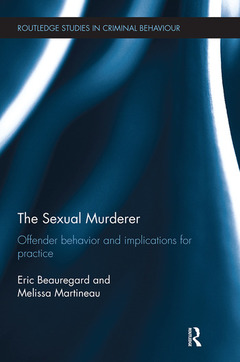Description
The Sexual Murderer
Offender behaviour and implications for practice
Routledge Studies in Criminal Behaviour Series
Authors: Beauregard Eric, Martineau Melissa
Language: English
Keywords
Sexual Homicide; Sexual Murderers; Victim’s Body; Criminal Psychology; Sex Trade Workers; Sex Crime; Sexual Offenders; Sex Offenders; Crime Scene; Deviant Sexual Fantasies; Non-homicidal Sex Offenders; Avoid Police Detection; Sexual Aggressors; Body Disposal; Sexual Homicide Cases; Exhaustive CHAID; Sexual Homicide Offender; Crime Commission Process; Victim’s Body Cavities; Ce Ne; Homicide Clearance Rates; Paraphilic Behavior; Forensic Awareness; Criminal Mobility; Offender’s Home Base; Fu Ll; CSI Effect; Women’s Boutique
57.55 €
In Print (Delivery period: 14 days).
Add to cartPublication date: 02-2018
· 15.6x23.4 cm · Paperback
166.30 €
In Print (Delivery period: 14 days).
Add to cartPublication date: 09-2016
250 p. · 15.6x23.4 cm · Hardback
Description
/li>Contents
/li>Readership
/li>Biography
/li>
Sexual homicide continues to be one of the most widely reported and sensationalised forms of murder, attracting fascination from the public and scholars alike. Despite this continued interest, few empirical studies have been conducted on this particular form of sexual crime. The Sexual Murderer provides an analytical review of the state of knowledge on the sexual murderer and his offense, and presents new data that confronts some of the accepted ideas and myths surrounding this type of homicide.
The authors draw on original data stemming from both offenders and the police to present an exhaustive and accurate picture of the sexual murderer and his offense, and compare the sex offenders who do kill with sex offenders who, despite being very violent, do not. Each chapter includes a section on the practical implications of the findings, and what the findings mean for professionals working with these cases and for the criminal justice system. This book explores themes including the role of fantasies, paraphilias, and personality; criminal career; context of the crime; journey to murder; modus operandi and crime scene; sex trade workers; avoiding detection; body disposal pathways; and whether we can predict sexual homicide occurrence.
This book is a comprehensive resource for academic and professionals involved in sexual homicide cases, such as psychologists, psychiatrists, investigators and profilers, as well as individuals working in the field of sexual violence. This book will also be of interest to students taking courses on homicide, sexual homicide, and serial homicide.
Foreword (D. Kim Rossmo)
Introduction. Why studying sexual murderers?
1. Can we identify sexual murderers early in life?
2. Fantasy, Paraphillia and Personality: Excitation or Inhibition?
3. Criminal career of the sexual murderer: Versatility or specialization?
4. Is there a specific context leading to sexual homicide?
5. How far sexual murderers travel to commit their crime?
6. Modus operandi and crime scene characteristics: Typical or unusual acts?
7. Sex trade workers: Choice of victim or victim of choice?
8. Can sexual murderers avoid police detection?
9. Can body disposal pathways help the investigation of sexual homicide? (Ashley Hewitt, Eric Beauregard, and Melissa Martineau)
Conclusion. Can we predict sexual homicide?
Eric Beauregard is Professor in the School of Criminology at Simon Fraser University in British Columbia, Canada, and a member of the Institute for Canadian Urban Research Studies (ICURS) at Simon Fraser University.
Melissa Martineau is Manager of Behavioural Sciences Research and Development working for the Royal Canadian Mounted Police in Ottawa, Ontario, Canada.




